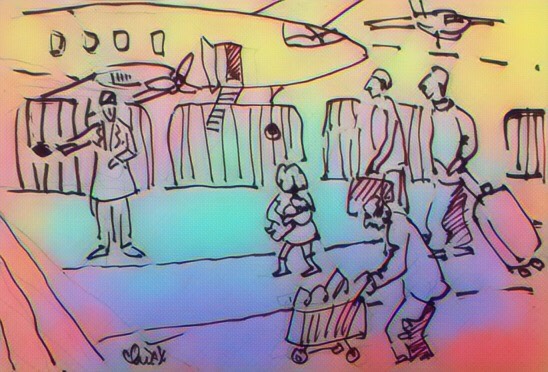 Talk Around Town
Talk Around Town

Foreign expats and tourists have reported discrimination in recent days in Việt Nam brought about by the COVID-19 pandemic.

|
| Illustration by Đàm Minh Chí |
Nguyễn Hằng
Foreign expats and tourists have reported discrimination in recent days in Việt Nam brought about by the COVID-19 pandemic.
Local media reported that a foreign tourist was refused service at six hotels in Ninh Bình Province on Sunday.
Daniel Hewitt, an English expat, shared on Facebook that he and his pregnant wife were denied entry to a health clinic in Hà Nội on Sunday without being given a reason.
Also on Facebook, Australian Jim Petersson said he had a motorbike accident in Cao Bằng Province recently and suffered an open wound on his neck and needed to be treated immediately. However, the only medical facility nearby refused to treat him because he was a foreigner. “Felt very insulted.. sad times,” he said.
Tilly Riisager, a British female expat living in Hà Nội, told Việt Nam News that people now look at her a lot on the bus.
The reports of discrimination come with Việt Nam and countries across the world fighting the COVID-19 pandemic that has killed almost 8,000, with infections close to 200,000. Việt Nam now has 76 infected cases by March 18.
In my opinion, the reaction of Vietnamese people is unusual but understandable at this time. It is because of fear.
The owner of a soft drinks shop in Lộc Thủy Commune, Phú Lộc District, Thừa Thiên Huế Province admitted that lately, he was not eager to sell soft drinks to foreigners as usual.
“I don’t discriminate against or hate them,” he said.
“I am afraid,” he said.
After hearing many cases of foreigners positive with SARS-CoV-2 in Việt Nam, he thought the best way was to keep his distance from them, he said.
Nguyễn Thu Thủy, a lecturer of the University of Social Sciences and Humanity, said she shared the concerns of service providers.
“Their reaction is easy to understand,” she added.
Việt Nam had reported 19 foreigners testing positive, so no one knew if foreigners on flights to Việt Nam had the virus or not, she said.
Lương Hoài Nam, a member of the Vietnam Tourism Advisory Board, told Thanh Niên (Young People) online newspaper that he did not condemn hotels that refused to serve foreigners as discriminatory.
“They have the right to worry (about the spread of the virus),” he said.
Bùi Văn Mạnh, deputy head of the Department of Culture, Sports and Tourism of Ninh Bình Province, said fear of the spread of the virus was to blame for the situation.
The department did not tell local hotels and restaurants to stop receiving foreigners, he said.
“We just told them to inform local authorities if any foreign visitor failed to make a health declaration,” he added.
The department had arranged accommodation for the “rejected” foreigners in a local hotel, he said.
What to do
Nam then advised each locality in the country to arrange hotels with appropriate facilities to prevent the virus spread to serve foreign tourists.
The hotels must be required to keep in close contact with local quarantine and health agencies, he said.
“Serving foreign tourists in a safe and organised way is the solution for the situation,” he said.
Agreeing with Nam, Lê Quốc Vinh, a marketing professional, posted on his Facebook account that accommodation for foreign tourists should be places that could meet standards to stop the virus spreading.
“We should handle the situation appropriately so that foreigners would wish to return to our country after the pandemic is over,” he added.
Thủy from the social sciences and humanity university proposed agencies build a data bank to store information on foreign tourists, including their medical declaration and travel itinerary.
This would help authorised agencies react quickly if necessary, she said.
The information would only be used for fighting the COVID-19 pandemic, she said.
In response to the situation, the Government of Việt Nam sent a legal document, signed by Chairman of the Office of the Government Mai Tiến Dũng, to the Ministry of Culture, Sports and Tourism and localities nationwide on Tuesday.
The document ordered the ministry and administration of each locality to correct and strictly deal with any service provider that was found to reject or discriminate against foreigners.
Dũng said the move aimed to preserve the image of a hospitable and friendly Việt Nam abroad.
Discrimination due to the pandemic is not a problem in Việt Nam alone but across the world.
To fix it, all of us should work together. I think countries, especially hard-hit countries, should recommend their citizens defer all non-essential travel abroad for at least 30 days to slow the spread of the new coronavirus like Singapore did. Việt Nam should support local hotels to equip themselves to both prevent the spread of the virus and serve foreigners in a safe and well-organised manner.
We can fight COVID-19 but still smile at foreigners. — VNS